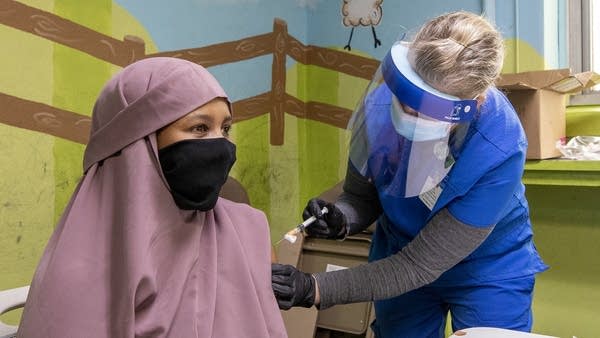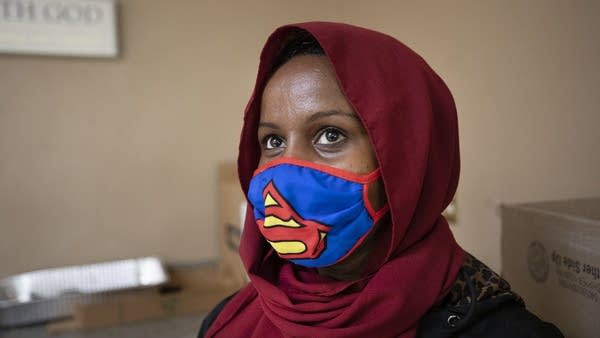Vaccine brings hope as Ramadan begins

Go Deeper.
Create an account or log in to save stories.
Like this?
Thanks for liking this story! We have added it to a list of your favorite stories.
The Islamic Center of St. Cloud looks vastly different now than it did a year ago.
In April 2020, senior Imam Mohamed Nuh Dahir stood alone in the mosque's vast hall, where hundreds of people typically gather for prayer, as coronavirus safety rules required mosques and other houses of worship to shut down.
"Last year, I didn't feel I was in Ramadan that time,” Dahir said, “because I was alone in my home, sick [with] COVID-19.”
But on Monday, the Islamic Center was bustling. People sat at tables lining the hallway, filling out paperwork to get the COVID-19 vaccine.
Turn Up Your Support
MPR News helps you turn down the noise and build shared understanding. Turn up your support for this public resource and keep trusted journalism accessible to all.
Dahir is hopeful people will be able to visit the mosque for prayers and gatherings during Ramadan, the Islamic holy month of fasting, prayer and reflection that began Monday evening.
After a long, challenging year, the availability of a COVID-19 vaccine has brought hope to many in Minnesota and around the globe. Islamic leaders pushed to get the vaccine to as many Muslims as possible before the start of Ramadan, with vaccination clinics planned at mosques in the Twin Cities, Rochester and St. Cloud.

Monday’s vaccination clinic at the mosque was part of the CentraCare health system's mobile vaccination effort. It's part of a strategy to reach communities in which people might be reluctant to come to a clinic or hospital because of language or cultural barriers or hesitation about getting the vaccine.
"We know that there's a lot of hesitancy,” said Jill Amsberry, a pediatrician helping lead CentraCare's vaccine distribution effort. “And part of that hesitancy includes going somewhere unfamiliar to receive an unfamiliar vaccine."
Bringing the vaccine to a familiar and trusted place, Amsberry said, increases people's comfort level.
Interpreters stood by to help people fill out paperwork and answer questions.
Earlier this month, the vaccine team came to this mosque expecting to give about 20 to 40 shots. Instead, 118 people showed up.
This time, Amsberry said, the team came ready to vaccinate up to 800. She said word often spreads quickly in St. Cloud’s close-knit Somali community.

“What often starts as just a few doses at the beginning of the day ends up being lots of doses by the end of the day,” Amsberry said, “as people are talking to each other and letting them know that we're here."
Hani Jacobson, a community health nurse for CentraCare, said it's clear that people feel more comfortable if the vaccine comes to them.
"We know that especially the mosque is kind of a place that they feel safe and welcome,” she said.
Jacobson said mosque leaders have been helping get the word out about the vaccine as Ramadan begins. She says many people are excited to be able to gather and pray together this year.
"In 2020, there was nothing going on at the mosque, and people are so eager to come back,” Jacobson said. “So getting vaccinated is one of the ways that they can do that together."

One of those who lined up for a shot on Monday was 27-year-old Ilhan Ali of St. Cloud. Ali said she thinks giving the vaccine in the mosque is a good idea and likely will draw more people.
"I think in my community, the mosque is going to be way, way easier than going to a clinic for the language barrier and stuff,” she said.
Yusuf Muhumed arrived early in the morning to get his shot, then returned later in the day with three family members. This is personal for Muhumed: He knows several people who passed away from COVID-19.
"I said, ‘Let's go and take the vaccine,’ ” he said. “I like to push all community [to] come here and take the vaccine."
St. Cloud's Somali American population was hit hard by the coronavirus early in the pandemic, after outbreaks at several meatpacking plants where many in the community work.

As providers work to overcome health disparities in communities of color, Amsberry said she hopes this outreach work is making connections that will outlast COVID-19.
"This is just the start of building bridges of trust in our community,” she said.
Health officials are still urging continued caution while attending prayers or social gatherings during Ramadan. That includes keeping group sizes small, wearing masks, socially distancing and staying home if you're sick.

COVID-19 in Minnesota
Data in these graphs are based on the Minnesota Department of Health's cumulative totals released at 11 a.m. daily. You can find more detailed statistics on COVID-19 at the Health Department website.
The coronavirus is transmitted through respiratory droplets, coughs and sneezes, similar to the way the flu can spread.



